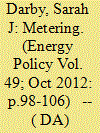|
|
|
Sort Order |
|
|
|
Items / Page
|
|
|
|
|
|
|
| Srl | Item |
| 1 |
ID:
099359


|
|
|
|
|
| Publication |
2010.
|
| Summary/Abstract |
International mandates for smart metering are enabling variable and real-time pricing regimes such as dynamic peak pricing (DPP), which charges 10-40 times the off-peak rate for electricity during short periods. This regime aims to reduce peak electricity demand (predominantly due to increase in residential air-conditioning usage) and curb greenhouse gas emissions. Although trials indicate that DPP can achieve significant demand reductions, particularly in summer, little is known about how or why households change their cooling practices in response to this strategy. This paper discusses the outcomes of a small qualitative study assessing the impact of a DPP trial on household cooling practices in the Australian state of New South Wales. The study challenges common assumptions about the necessity of air-conditioning and impact of price signals. It finds that DPP engages households as co-managers of their cooling practices through a series of notification signals (SMS, phone, in-home display, email, etc.). Further, by linking the price signal to air-conditioning, some householders consider this practice discretionary for short periods of time. The paper concludes by warning that policy makers and utilities may serve to legitimise air-conditioning usage and/or negate demand reductions by failing to acknowledge the non-rational dynamics of DPP and household cooling practices.
|
|
|
|
|
|
|
|
|
|
|
|
|
|
|
|
| 2 |
ID:
117321


|
|
|
|
|
| Publication |
2013.
|
| Summary/Abstract |
Implementing smart metering is an important field for energy policy to successfully meet energy efficiency targets. From an integrated social acceptance and customer-perceived value theory perspective we model the importance of customer value of smart metering in this regard. We further shape the model on a choice-based conjoint experiment with Swiss private electricity customers. The study finds that overall customers perceive a positive value from smart metering and are willing to pay for it. Further, based on a cluster analysis of customers' value perceptions, we identify four customer segments, each with a distinct value perception profile for smart metering. We find that energy policy and management should integrate a solid understanding of customer value for smart metering in their initiatives and consider different smart metering market segments within their measures.
|
|
|
|
|
|
|
|
|
|
|
|
|
|
|
|
| 3 |
ID:
125620


|
|
|
|
|
| Publication |
2013.
|
| Summary/Abstract |
This paper analyzes the effects of providing feedback on electricity consumption in a field trial involving more than 1500 households in Linz, Austria. About half of these households received feedback together with information about electricity-saving measures (pilot group), while the remaining households served as a control group. Participation in the pilot group was random, but households were able to choose between two types of feedback: access to a web portal or written feedback by post. Results from cross section OLS regression suggest that feedback provided to the pilot group corresponds with electricity savings of around 4.5% for the average household. Our results from quantile regressions imply that for households in the 30th to the 70th percentile of electricity consumption, feedback on electricity consumption is statistically significant and effects are highest in absolute terms and as a share of electricity consumption. For percentiles below or above this range, feedback appears to have no effect. Finally, controlling for a potential endogeneity bias induced by non random participation in the feedback type groups, we find no difference in the effects of feedback provided via the web portal and by post.
|
|
|
|
|
|
|
|
|
|
|
|
|
|
|
|
| 4 |
ID:
149884


|
|
|
|
|
| Summary/Abstract |
Whilst tariff-based approaches to load-shifting are common in the residential sector, incentive-based approaches are rare. This is so, even though providing customers incentives to shape their power consumption patterns has substantial potential. This paper presents findings from an exploratory UK pilot study that trials financial payments and detailed energy feedback to incentivise load-shifting of residential electricity consumption.
|
|
|
|
|
|
|
|
|
|
|
|
|
|
|
|
| 5 |
ID:
098685


|
|
|
|
|
| Publication |
2010.
|
| Summary/Abstract |
This paper explores how UK householders interacted with feedback on their domestic energy consumption in a field trial of real-time displays or smart energy monitors. After examining relevant bodies of literature on the effects of energy feedback on consumption behaviour, and on the complex role of energy and appliances within household moral economies, the paper draws on qualitative evidence from interviews with 15 UK householders trialling smart energy monitors of differing levels of sophistication. It focuses specifically on householder motivations for acquiring the monitors, how the monitors have been used, how feedback has changed consumption behaviour, and the limitations to further behavioural change the householders experienced. The paper concludes by identifying significant implications for future research and policy in this area.
|
|
|
|
|
|
|
|
|
|
|
|
|
|
|
|
| 6 |
ID:
115636


|
|
|
|
|
| Publication |
2012.
|
| Summary/Abstract |
Fuel poverty is a function of household energy consumption, income, and the cost of delivered energy. The paper discusses ways in which current EU policy on the development of 'smart' metering could affect fuel poor households. The main focus is on developments in electricity metering and the development of 'active demand' and smart grids, so that demand can be matched closely with available supply. Advances in metering and related technologies open the way to time-of-use charging, easier switching between suppliers and between credit payment and prepayment, direct load control of some end-uses by the utility, greater scope for microgeneration, and improved consumption feedback for customers. These options open up both uncertainties and risks.
The paper offers definitions and discussion of various functions of smart metering, summarizes the EU policy background, and considers some possible equity implications of rolling out a new generation of meters. There follows an assessment of potential implications to the fuel poor of changes to metering, based on a review of the literature on energy feedback, tariffing, and supplier-customer relationships. Much of the discussion is based on the UK experience, with examples from other EU member states and, where appropriate, from other parts of the world.
|
|
|
|
|
|
|
|
|
|
|
|
|
|
|
|
| 7 |
ID:
175242


|
|
|
|
|
| Summary/Abstract |
Within this study, we focus on the consumers’ preferences regarding smart meters (SM). An empirical study has been conducted among Indian social media users, who are predicted to be potential early adopters or innovators in case of SM further market penetration. By dividing the respondents into a few market segments, the study highlights differences between consumers already having SM installed at their household, consumers in the process of installing SM, and consumers who would like to have SM in the future. The study also outlines the profile of consumers who currently have SM installed in their household. Results show that tech-savviness of India’s consumers, common access to the internet for citizens, possession of smart phones by most of the population and ambitious goals of the Indian government, are a very productive mix for a nation wide roll-out of SM in India in the coming years.
|
|
|
|
|
|
|
|
|
|
|
|
|
|
|
|
| 8 |
ID:
116733


|
|
|
|
|
| Publication |
2012.
|
| Summary/Abstract |
Because of its fluctuating nature, the feed-in of renewable energy sources into low-voltage distribution grids complicates the balancing of demand and supply. This carries the risk of grid instabilities causing damage to electronic devices and power outages, which eventually lead to deadweight losses. In principle, the problems arising from fluctuating feed-in can be solved by increasing demand elasticity or decoupling generation and consumption; for the first, an advanced metering infrastructure and, for the second, decentralized electricity storage are considered core enablers. However, to date, the diffusion of these future smart grids' core components is low. The present study provides new insights for understanding and overcoming diffusion barriers. For this purpose, a qualitative research approach was chosen. The most important stakeholders as well as related private costs and benefits are identified. The findings show that both of these smart grid components are widely considered beneficial to society by experts. However, because the numerous private benefits are widely distributed among distinct players, socially desired investments are hampered by positive externalities. The importance of well-designed and consistent regulatory and legal frameworks that provide economic incentives to involved stakeholders is highlighted in the results.
|
|
|
|
|
|
|
|
|
|
|
|
|
|
|
|
| 9 |
ID:
137682


|
|
|
|
|
| Summary/Abstract |
This study uses high-frequency appliance-level electricity consumption data for 124 apartments over 24 months to provide a better understanding of appliance-level electricity consumption behavior. We conduct our analysis in a standardized set of apartments with similar appliances, which allows us to identify behavioral differences in electricity use. The Results show that households' estimations of appliance-level consumption are inaccurate and that they overestimate lighting use by 75% and underestimate plug-load use by 29%. We find that similar households using the same major appliances exhibit substantial variation in appliance-level electricity consumption. For example, households in the 75th percentile of HVAC usage use over four times as much electricity as a user in the 25th percentile. Additionally, we show that behavior accounts for 25–58% of this variation. Lastly, we find that replacing the existing refrigerator with a more energy-efficient model leads to overall energy savings of approximately 11%. This is equivalent to results from behavioral interventions targeting all appliances but might not be as cost effective. Our findings have important implications for behavior-based energy conservation policies.
|
|
|
|
|
|
|
|
|
|
|
|
|
|
|
|
|
|
|
|
|